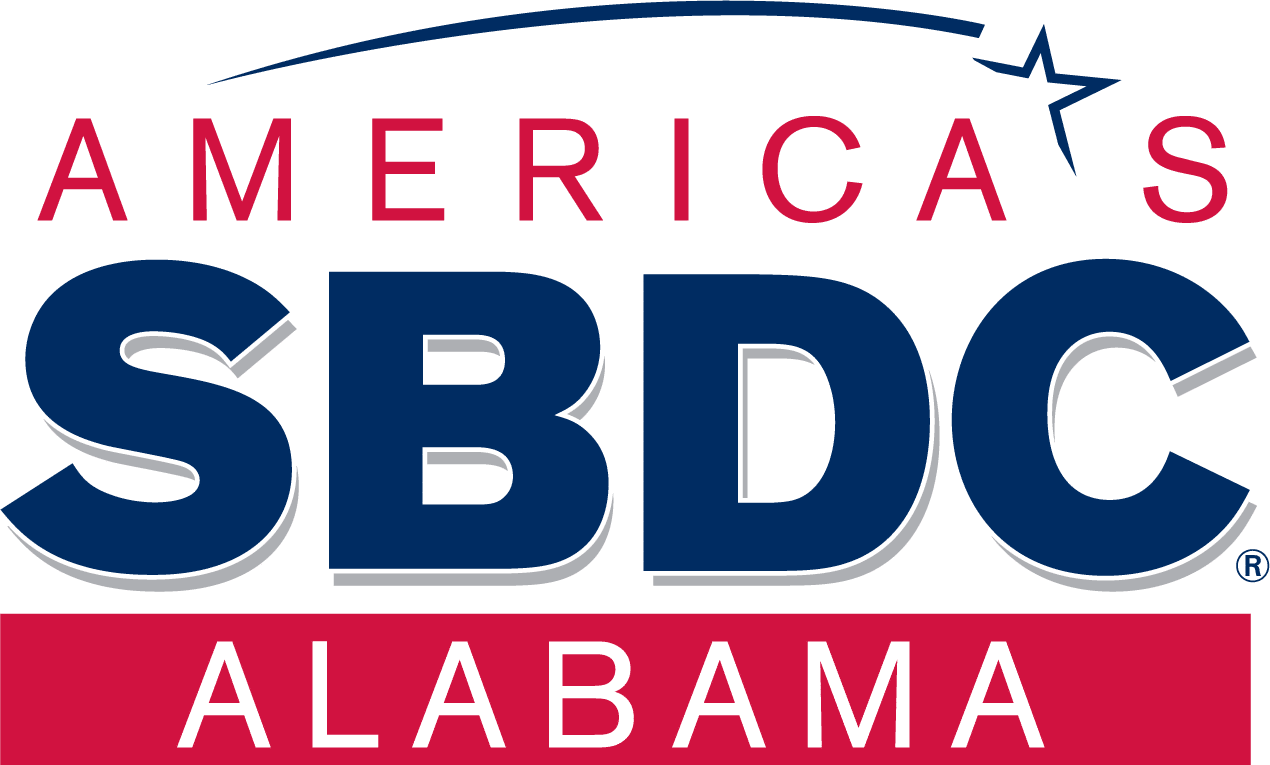COVID Assistance
The COVID-19 pandemic has impacted entrepreneurs and small business owners throughout Alabama. We have compiled a short list of reliable information sources that you can use to guide your business through this disruption. Contact your local SBDC Business Advisor to learn more.

- AL Guide to Conquering a Business Crisis: Checklist of things to consider when dealing with a crisis.
- Disaster Planning & Recovery Guide : While this guide was written for our more common physical disasters (tornadoes, hurricanes, oil spills, “winter weather events”), much of the content is applicable today.
- Checklist for Managing in Times of Financial Difficulty. While there is no single cure-all, there are many steps a business owner can take to manage through the difficult times and position the business for future growth. This checklist provides some tips and suggestions.
- Emergency Plan: You can download our Emergency Plan at the bottom of our Disaster Guide page. While probably too late for this disaster, hurricane season is right around the corner.
- How to Market During COVID-19
Common Issues Small Businesses May Encounter:
- Capital Access – Incidents can strain a small business’s financial capacity to make payroll, maintain inventory and respond to market fluctuations (both sudden drops and surges in demand). Businesses should prepare by exploring and testing their capital access options so they have what they need when they need it. See SBA’s capital access resources.
- SBA Economic Injury Disaster Loan (EIDL): EIDLs provide eligible small businesses (and certain nonprofit organizations & agricultural cooperatives) up to $2 million to help meet financial obligations and operating expenses that could have been met had the disaster not occurred.
- Workforce Capacity – Incidents have just as much impact on your workers as they do your clientele. It’s critical to ensure they have the ability to fulfill their duties while protected.
- Inventory and Supply Chain Shortfalls – While the possibility could be remote, it is a prudent preparedness measure to ensure you have either adequate supplies of inventory for a sustained period and/or diversify your distributor sources in the event one supplier cannot meet an order request.
- Facility Remediation/Clean-up Costs – Depending on the incident, there may be a need to enhance the protection of customers and staff by increasing the frequency and intensity by which your business conducts cleaning of surfaces frequently touched by occupants and visitors. Check your maintenance contracts and supplies of cleaning materials to ensure they can meet increases in demand.
- Insurance Coverage Issues – Many businesses have business interruption insurance; Now is the time to contact your insurance agent to review your policy to understand precisely what you are and are not covered for in the event of an extended incident.
- Changing Market Demand – Depending on the incident, there may be access controls or movement restrictions established which can impede your customers from reaching your business. Additionally, there may be public concerns about public exposure to an incident and they may decide not to go to your business out of concern of exposing themselves to greater risk. SBA’s Resources Partners and District Offices have trained experts who can help you craft a plan specific to your situation to help navigate any rapid changes in demand.
- Marketing – It’s critical to communicate openly with your customers about the status of your operations, what protective measures you’ve implemented, and how they (as customers) will be protected when they visit your business. Promotions may also help incentivize customers who may be reluctant to patronize your business.
- Plan – As a business, bring your staff together and prepare a plan for what you will do if the incident worsens or improves. It’s also helpful to conduct a tabletop exercise to simulate potential scenarios and how your business management and staff might respond to the hypothetical scenario in the exercise. For examples of tabletop exercises, visit FEMA’s website at: https://www.fema.gov/emergency-planning-exercises
- Guidance for Businesses and Employers Responding to Coronavirus Disease 2019 (COVID-19)
Plan, Prepare and Respond to Coronavirus Disease 2019 - Interim Guidance for Businesses and Employers to Plan and Respond to Coronavirus Disease 2019 (COVID-19)
- Preventing Stigma Related to COVID-19
- Share Facts about COVID-19
- CDC Coronavirus Disease 2019 (COVID-19) Web page
- Information on Coronavirus Disease 2019 (COVID-19) Prevention, Symptoms and FAQ
The programs and initiatives in the Coronavirus Aid, Relief, and Economic Security (CARES) Act are intended to assist business owners impacted by the pandemic. This page provides information about the major programs and initiatives from the Small Business Administration (SBA) to address the evolving needs of small business owners, as well as some additional tax provisions that are outside the scope of SBA.
To keep up to date on when these programs become available, please follow us on social media: Facebook.com/AlabamaSBDC, or follow SBAgov on Twitter.
Lenders can accept PPP applications through May 31, 2021, and SBA is allow to continue to process those applications through the end of June. Contact your lender to determine if they are participating in these SBA programs, and how you can apply.
- First Draw PPP loans: If you have not received a PPP loan before, First Draw PPP loans are available to you.
- Second Draw PPP loans: If you have previously received a PPP loan, certain businesses are eligible for a Second Draw PPP loan.
- PPP Forgiveness: A borrower can apply for forgiveness once all loan proceeds for which the borrower is requesting forgiveness have been used. Borrowers can apply for forgiveness any time up to the maturity date of the loan. If borrowers do not apply for forgiveness within 10 months after the last day of the covered period, then PPP loan payments are no longer deferred, and borrowers will begin making loan payments to their PPP lender.
Updated PPP Forms (January 2021)
- Form 2483 – First Draw Borrower Application (Updated 1/8/21)
- Form 2484 – First Draw Lender Guaranty Application (Updated 1/8/21)
- Form 2483-SD – Second Draw Borrower Application (Released 1/8/21)
- Form 2484-SD – Second Draw Lender Guaranty Application (Released 1/8/21)
- Form 3508S – Loan Forgiveness Application Instructions (Revised & Released 1/19/21)
Updated Guidance & Resources
- Accessing Capital for Minority Underserved, Veteran and Women-Owned Business Concerns Guidance (Released 1/6/21)
- Top-Line Overview of First Draw PPP Loans (Released 1/8/21)
- Top-Line Overview of Second Draw PPP Loans (Released 1/8/21)
- Interim Final Rule #1 – PPP as Amended by Economic Aid Act (Released 1/6/21)
- Interim Final Rule #2 – PPP Second Draw Loans (Released 1/6/21)
- Procedural Notice – Modifications to SBA Forms 3506, 3507 and 750 CA (PPP only) (Released 1/8/21)
- Procedural Notice – SBA Procedural Notice on Repeal of EIDL Advance Deduction Requirement (Released 1/8/21)
SBA Economic Injury Disaster Loan (EIDL)
- Amount: For loans approved starting the week of April 6, 2021: 24-months of economic injury with a maximum loan amount of $500,000. For loans approved prior to the week of April 6, 2021, see loan increases.
- Terms: 3.75% for businesses (fixed), 2.75% for nonprofits (fixed), 30 years, No pre-payment penalty or fees
- Use of proceeds: Working capital and normal operating expenses
- Collateral: Required for loans over $25,000; SBA uses a general security agreement (UCC) designating business assets as collateral, such as machinery and equipment, furniture and fixtures, etc.
- Forgivable? Only the advance is forgivable. This is a Disaster Loan product, and must be paid back.
- Frequently Asked Questions about the COVID-19 EIDL
- Cross-program eligibility on SBA COVID-19 relief options
- Frequently Asked Questions for Faith-Based Organizations Participating in the PPP and EIDL
- Frequently Asked Questions Regarding Agricultural and Farm Loan Collateral Security and the SBA EIDL Program
- Loan Increases: Some loans approved prior to the week of April 6, 2021 will be eligible for an increase based on new loan maximum amounts announced March 24, 2021. Businesses that received a loan subject to current loan limit do not need to submit a request for an increase at this time. SBA will reach out directly via email closer to the April 6, 2021 implementation date to provide more details about how businesses can request an increase. If an applicant accepted a loan for less than the full amount originally offered, the application will have up to two years after the date of the loan promissory note to request to request additional funds. Applicants may continue to request additional funds even after the application deadline of December 31, 2021.
- Targeted EIDL Advance: The COVID-19 Targeted EIDL Advance was signed into law on December 27, 2020, as part of the Economic Aid to Hard-Hit Small Businesses, Non-Profits, and Venues Act. The Targeted EIDL Advance provides businesses in low-income communities with additional funds to ensure small business continuity, adaptation, and resiliency. Advance funds of up to $10,000 will be available to applicants in low-income communities who previously received an EIDL Advance for less than $10,000, or those who applied but received no funds due to lack of available program funding.Applicants do not need to take any action. SBA is reaching out to those who qualify. Learn more about the Targeted EIDL Advance.
- Mapping tool: https://sbaeidl.policymap.com/app
The Shuttered Venue Operators Grant (SVOG) program was established by the Economic Aid to Hard-Hit Small Businesses, Nonprofits, and Venues Act, and amended by the American Rescue Plan Act. The program includes over $16 billion in grants to shuttered venues, to be administered by SBA’s Office of Disaster Assistance. Eligible applicants may qualify for grants equal to 45% of their gross earned revenue, with the maximum amount available for a single grant award of $10 million. $2 billion is reserved for eligible applications with up to 50 full-time employees.
- Frequently Asked Questions about SVOG
- Eligibility requirements
- Preliminary application checklist
- Cross-program eligibility on SBA COVID-19 relief options
Who can apply?
Eligible entities include:
- Live venue operators or promoters
- Theatrical producers
- Live performing arts organization operators
- Relevant museum operators, zoos and aquariums who meet specific criteria
- Motion picture theater operators
- Talent representatives
- Each business entity owned by an eligible entity that also meets the eligibility requirements
Other requirements of note:
- Must have been in operation as of February 29, 2020
- Venue or promoter who received a PPP loan on or after December 27, 2020, will have the SVOG reduced by the PPP loan amount
- Shuttered Venue Operators Grant Overview
- SAM.gov Entity Registration Training
- Eligibility for Live Venue Operators or Promoters
- Eligibility for Talent Representatives
- Eligibility for Museum Operators
- Eligibility for Motion Picture Theatre Operators
- Eligibility for Live Performing Arts Organization Operators
- Use of Funds
Details Coming Soon. Expected to Launch in April 2021.
